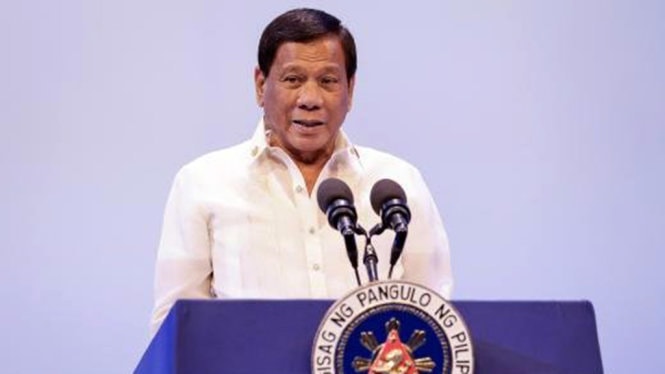Dr. Tran Cong Truc: ASEAN 30 Declaration may cause outrage
According to Dr. Tran Cong Truc, the statement issued by the host country, the Philippines, after the end of the ASEAN Summit on April 30 will cause outrage and surprise because the phrases “island building” and “militarization” will no longer exist.
The host country, the Philippines, issued a statement on the morning of April 30, one day after the 30th ASEAN Summit ended in Manila.
 |
| Philippine President Rodrigo Duterte speaks at the 30th ASEAN Summit on April 29 - Photo: Reuters |
|
The statement, known as the “Chairman’s Statement,” was not only delivered later than usual but also cut out phrases about the South China Sea dispute.
The Chairman's Statement is a common position statement based on the consensus principle of the leaders of the 10 ASEAN countries on a series of issues on three main pillars including: politics - security, economy and culture - society. The Chairman's Statement is announced by the host country of the ASEAN Summit at the end of each annual ASEAN Summit.
No mention of militarization and island building
Although China was not mentioned, several leaders made it clear during the meetings on the opening day of the 30th ASEAN Summit on April 29 that they opposed militarization and land reclamation in the East Sea. However, the final Chairman’s Statement of the host country did not mention these phrases.
Even the phrase “fully respecting the diplomatic and legal processes” (PV - referring to the arbitration court's ruling) which was mentioned in the draft statement was cut out.
When referring to the East Sea dispute, the statement only spoke generally: “ASEAN countries stressed the importance of maintaining peace, stability, security and freedom of navigation and overflight in disputed waters.
ASEAN also expressed serious concerns over recent developments and increased activities in the area, which may further increase tensions and erode investor confidence in the region.”
“We reaffirmed the importance of enhancing mutual trust and confidence, exercising self-restraint in the conduct of activities, avoiding actions that may complicate the situation, and pursuing peaceful resolutions of disputes without resorting to the threat or use of force,” the statement added.
We stressed the importance of the full and effective implementation of the Declaration on the Conduct of Parties in the South China Sea (DOC). We noted the improved relations between ASEAN and China.
We welcome the completion of the framework of the Code of Conduct of Parties in the South China Sea (COC) by mid-year, to facilitate the early conclusion of an effective COC. We recognize the long-term benefits to be gained from a peaceful, stable and sustainably developed South China Sea.”
At a press conference at the Philippine International Convention Center (PICC) on the evening of April 29, Philippine President Rodrigo Duterte said that ASEAN leaders' discussion of China's construction projects in the East Sea was a futile act, noting that the Philippines did not have the military capacity to stop it.
“There is no word about that (military structures - PV) but we want to have a code of conduct (COC) by the end of this year so that people will feel comfortable sailing there,” Mr. Duterte told reporters.
Earlier, Mr. Duterte said he was willing to temporarily set aside the arbitration court's ruling to promote stronger relations with China, although he affirmed that he would never "sell" the Philippines' interests in the East Sea.
“Complete reversal”
Speaking to Tuoi Tre, expert Shahriman Lockman from the Center for Strategic and International Studies commented that in general, the Philippines' Chairman's Statement was softer in tone than the statement in Laos last year.
“This statement is a complete about-face as ‘militarization’ and ‘land reclamation’ were mentioned in the draft statement but were not included in the final version. Duterte will be attending the One Belt, One Road summit in Beijing in mid-May, and this must be on his mind,” Shahriman said.
Dr. Jay Batongbacal, director of the Philippine Institute for Maritime Affairs and Law of the Sea, commented to Tuoi Tre that President Duterte's failure to mention land reclamation and militarization in the East Sea as well as the arbitral tribunal's ruling in his Presidential Statement clearly reflects his attitude.
Overall, the Chairman's Statement devoted much of its content to economic cooperation, such as progress on current ASEAN projects and initiatives, according to Dr. Jay.
“President Duterte has previously made it clear that he does not think the above issues are worth discussing and he does not want to create any trouble for China,” Dr. Jay Batongbacal emphasized.
Strategic options Emotionally, I am sure many people will be upset and surprised that the phrases “island building” and “militarization” are no longer shown in this statement. However, many opinions also believe that this is the most strategic and realistic option in the context of the imbalance in power not only between China and ASEAN countries but also between superpowers, including the US and China, in the increasingly fierce geo-strategic, geo-political, geo-economic disputes in the Asia-Pacific region. This dispute is a potential risk leading to conflict and war. Therefore, the top priority in the current situation is that all countries must unite, join forces to prevent war, maintain peaceful relations, and not create an excuse for superpowers to cause trouble in troubled waters, because if conflict or war occurs, as President Tran Dai Quang declared, then certainly no one will win. ASEAN countries, if deemed necessary, still have the right to declare their position and condemn any action that violates their legitimate rights and interests in the East Sea. This is necessary and has legal value according to the principles of current international law and practice. Dr. TRAN CONG TRUC(former head of the Government Border Committee). |
According to TTO
